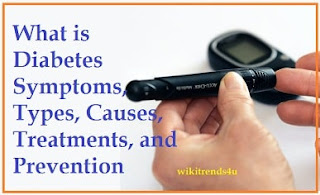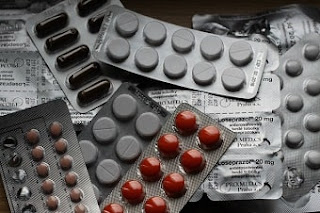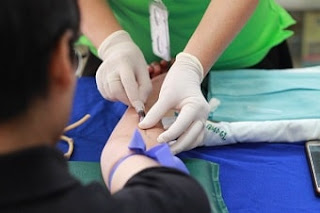Lifestyle
May 23, 2020
What is Diabetes Symptoms, Types, Causes, Treatments, and Prevention
DIABETES DEFINITION [ DIABETES MEANING]
Diabetes is a disease that occurs when blood glucose, also called blood sugar, is too high. Blood glucose mainly gives energy to our body and comes from the eaten food. Insulin, a hormone produced by the pancreas, helps glucose from the food enter cells to be used for energy. Sometimes your body doesn't make enough insulin, or none at all, or doesn't use insulin well. Glucose remains in the blood and does not reach the cells. If you eat too much glucose then it can cause health problems. Although there is no cure for diabetes, you can take steps to control your diabetes and stay healthy. People sometimes call diabetes "a sugar spike" or "borderline diabetes." These terms suggest that someone really does not have diabetes or has a less severe case, but all cases of diabetes are serious.
TYPE 1 DIABETES
Type 1 diabetes is also called insulin-dependent diabetes. It used to be called juvenile-onset diabetes, because it often starts in childhood. Type 1 diabetes is an autoimmune condition. It occurs when your body attacks your pancreas with antibodies. The organ is damaged and does not produce insulin. Your genes can cause this type of diabetes. It could also occur due to problems with cells in the pancreas that make insulin.
Many of the health problems that can arise with type 1 occur due to damage to the small blood vessels in the eyes (called diabetic retinopathy), nerves (diabetic neuropathy), and kidneys (diabetic nephropathy). People with type 1 also have an increased risk of heart disease and stroke.
Treatment for type 1 diabetes involves injecting insulin into the fatty tissue just below the skin. You can use:
- Syringes
- Insulin pens that use pre-filled cartridges and a thin needle
- Pumps that deliver insulin through a tube to a catheter under the skin of the abdomen.
If you have type 1 diabetes, you will need to make changes that include:
- Frequent tests of your blood sugar levels.
- Careful meal planning.
- Daily exercise
- Take insulin and other medications as needed.
About 90% of diabetes people have type 2 diabetes.
In type 2 diabetes, your pancreas usually creates some insulin. But either it is not enough or your body does not use it as it should. Insulin resistance, when your cells don't respond to insulin, generally occurs in fat, liver, and muscle cells. Type 2 diabetes is less harmful than type 1 diabetes. But it can still cause major health complications, especially in the small blood vessels in the kidneys, nerves, and eyes. Type 2 also increases your risk of heart disease and stroke.
People who are obese (more than 20% above their target body weight for height) are at especially high risk for type 2 diabetes and the health problems that may follow. Obesity stops the production of enough insulin, so your pancreas has to work harder to make more insulin. But it still isn't enough to keep your blood sugar levels where they should be.Treatment for type 2 diabetes involves maintaining a healthy weight, eating well, and exercising. Some people also need medications.
Your doctor may do an A1C test several times a year to see how well you have been controlling your blood sugar.
GESTATIONAL DIABETES
Pregnancy generally causes some form of insulin resistance. If this turns into diabetes, it is called gestational. Doctors often see it in the middle or late pregnancy. Because a woman's blood sugar travels through her placenta to her baby, it is important to control gestational diabetes to protect the baby's growth and development.
It usually disappears after birth. But up to 10% of women who have gestational diabetes have type 2, weeks, or even years later.
Gestational diabetes is riskier for the baby than for the mother. A baby may have unusual weight gain before birth, trouble breathing at birth, or an increased risk of obesity and diabetes later in life. The mother may need a C-section due to an overly large baby, or she may have damage to her heart, kidney, nerves, and eyes.
Gestational diabetes treatment involves:
- Careful meal planning to ensure you get enough nutrients without too much fat and calories.
- Daily exercise
- Keep weight gain under control
- Take insulin to control your blood sugar levels, if necessary.
- Increased thirst.
- Frequent urination
- Wetting the bed in children who have not previously wet the bed at night.
- Extreme hunger
- Involuntary weight loss
- Irritability and other mood swings.
- Fatigue and weakness.
- Blurry vision
- Frequent urination
- Increased thirst
- He is always hungry
- Feeling very tired
- Blurry vision
- Slow healing of wounds
- Tingling in the hands or feet
- Dark skin spots
- Sugar in the urine (revealed in a test performed in your doctor's office)
- Be unusual.
- Frequent urination.
- Fatigue.
- Nausea
- Frequent vaginal, bladder, and skin infections.
- Blurry vision
TYPE 1 DIABETES CAUSESThe actual cause of type 1 diabetes is not clear. The body's own immune system, which normally fights off harmful bacteria and viruses, mistakenly destroys insulin-producing cells (islets or islets of Langerhans) in the pancreas. Other possible causes include:
- Genetics
- Some microorganisms and other factors
- The role of insulin.
Once a significant number of islet cells are destroyed, it will produce little or no insulin. Insulin is a hormone that comes from a gland behind and below the stomach (pancreas).
- The pancreas secretes insulin into the bloodstream.
- Insulin reduces the amount of sugar in the bloodstream.
The role of glucose.Glucose, a sugar, is a major source of energy for cells that make up muscles and other tissues.
- Glucose comes from two main sources: food and the liver.
- Your liver stores glucose as glycogen.
- When your glucose levels are low, such as when you haven't eaten in a while, the liver breaks down stored glycogen into glucose to keep your glucose levels within a normal range.
WHAT CAUSES TYPE 2 DIABETES [TYPE 2 DIABETES CAUSES]
Insulin is a natural hormone. Your pancreas produces it and releases it when you eat. Insulin helps transport glucose from the bloodstream to cells throughout the body, where it is used for energy.
In type 2 diabetes the body becomes resistant to insulin. Your body no longer uses the hormone efficiently. This forces the pancreas to work harder to make more insulin.
Over time, this can damage the cells of the pancreas. Eventually, your pancreas may not be able to make insulin.
If you don't make enough insulin or your body doesn't use it efficiently, glucose builds up in your bloodstream. This leaves the cells of your body without energy. Doctors don't know exactly what triggers this series of events.It may have to do with cellular dysfunction in the pancreas or with cell signaling and regulation.
There is definitely a genetic predisposition to obesity, which increases the risk of insulin resistance and diabetes. Most likely, it is a combination of factors that increases the risk of type 2 diabetes.
TREATMENT
Type 1 1diabetes People can live long and healthy lives. You will need to closely monitor your blood sugar levels. Your doctor will give you a range within which the numbers must remain. Adjust your insulin, food, and activities as needed.All people with type 1 diabetes should use insulin injections to control blood sugar.When your doctor talks about insulin, he will mention three main things:
- "Start" is the time it takes to get into the bloodstream and begin to lower blood sugar.
- "Peak Time" is when insulin is doing the most work in terms of lowering blood sugar.
- "Duration" is the time that continues to run after startup.
- Quick action starts working in about 15 minutes. Its peak reaches about 1 hour after taking it and continues to work for 2 to 4 hours.
- Regular or short-acting action starts working in about 30 minutes. I peak between 2 and 3 hours and continue working for 3 to 6 hours.
- The intermediate action will not enter the bloodstream for 2 to 4 hours after the injection. Its peak is 4 to 12 hours and works from 12 to 18 hours.
- Prolonged action takes several hours to enter your system and takes approximately 24 hours.
- Biguanides. This group includes metformin, one of the most widely used drugs to treat diabetes. It tells your liver to keep some of the glucose it makes.
- Meglitinides and sulfonylureas. These medications tell the pancreas to make more insulin.
- DPP-4 inhibitors prevent your body from breaking down the hormones that give the pancreas the "go" signal for insulin. This means that they work longer when you need to lower your blood sugar after a meal.
- Thiazolidinediones, TZD, or glitazones. These medications help insulin work better. They decrease the insulin resistance of your cells so that your pancreas does not have to work as hard.
- Alpha-glucosidase inhibitors slow the digestion of food with complex carbohydrates such as bread, pasta, rice, potatoes, and corn. This prevents your blood sugar level from skyrocketing after eating.
- SGLT2 inhibitors work by allowing the kidneys to urinate additional sugar.
- Bile acid sequestrants lower cholesterol and can also help lower blood glucose.
- You can take these medications alone or in combination with others, including insulin. Some pills have more than one type of drug.
- Dopamine receptor agonists work directly in the brain to help it process dopamine. This, in turn, can increase your insulin sensitivity, so your body doesn't need as much. Those taking dopamine receptor agonists should also implement some lifestyle changes, such as a healthy diet and exercise, to make the medication more effective.
- GLP-1 receptor agonists help the pancreas make insulin. Some of them take them every day, while others last a week.
- Pramlintide (Symlin) acts like a hormone, amylin, which is sent by the pancreas with insulin. You only take it if you are also using insulin.
DIABETES SUGAR LEVELS
For most healthy people, normal blood sugar levels are as follows:
- 4.0 to 5.4 mmol / L (72 to 99 mg / dL) During fasting
- Up to 7.8 mmol / L (140 mg / dL) 2 hours after food
- Before food: 4 to 7 mmol / L for people with type 1 or type 2 diabetes
- After food: less than 9 mmol / L for people with type 1 diabetes and less than 8.5 mmol / L for people with type 2 diabetes
|
BLOOD SUGAR
CHART
|
|
|
Fasting
|
|
|
|
70–99 mg/dl (3.9–5.5 mmol/L)
|
|
Official
|
80–130 mg/dl (4.4–7.2 mmol/L)
|
|
1 to 2 hours after meals
|
|
|
|
Less than 140 mg/dl (7.8 mmol/L)
|
|
Official
|
Less than 180 mg/dl (10.0 mmol/L)
|
|
HbA1c
|
|
|
|
Less than 5.7%
|
|
Official
|
Less than 7.0%
|
- Fasting: at 92 mg / dL or more
- 1 hour: at 180 mg / dL or more
- 2 hours: at 153 mg / dL or more
A blood sugar level lower than 140 mg / dL is considered normal. A blood sugar level of 140 to 199 mg / dL (7.8 to 11.0 mmol / L) is considered prediabetes. This is sometimes known as glucose intolerance. A blood sugar level of 200 mg / dL (11.1 mmol / L) or more indicates type 2 diabetes.
HOW TO PREVENT DIABETES [ DIABETES PREVENTION]
- Get more physical activity
- Get plenty of fiber
- Go for whole grains
- Lose extra weight
Keep your blood pressure and cholesterol under control. Eating healthy foods and exercising regularly can be very helpful in controlling high blood pressure and cholesterol. Medication may also be necessaryIf you smoke or use other forms of tobacco, ask your doctor to help you quit smoking. Smoking increases the risk of complications of diabetes, such as heart attack, stroke, nerve damage, and kidney disease.If you drink alcohol, do it responsibly. Alcohol can cause high or low blood sugar levels, depending on how much you drink and whether you eat at the same time.Take stress seriously. The hormones that your body can produce in response to prolonged stress can prevent insulin from working properly, which can further stress and frustrate you.
HOW TO PREVENT TYPE 2 DIABETES
- Control your diabetes risk. Take life!
- Control your weight.
- Exercise regularly.
- Eat a balanced and healthy diet.
- Limit takeout and processed foods.
- Limit your alcohol intake.
- Quit smoking.
- Control your blood pressure.
HOW TO PREVENT GESTATIONAL DIABETES
- Achieve a healthy weight and make a good lifestyle.
- Exercise
- Eat well for you Foods
- Keep in touch with doctors advice and treatments
What Foods can Diabetics Eat Freely?
[Foods that prevent diabetes]
• Fiber• vitamins• Small amounts of protein and fat.• Integral rice• Integral• Quinoa• Steel-cut oats• Vegetables• fruits• Beans• lentils• Potatoes• Squash• Corn• Other tubers
I hope you like this post about What is Diabetes Symptoms, Types, Causes, Treatments, and Prevention. Please share this information with your friends and on social media to spread knowledge. If you have any problem or query about this post then feel free to comment below.















